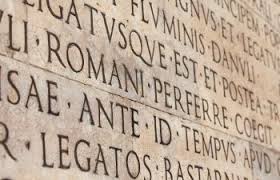way back, many years ago, when I was in secondary school, Latin was required.
today, I am not sure that most young people even know what the word Latin means or represents.
I grew up in the era when our parents and teachers and mentors all told us that learning the Latin language is really important.
why? they said that you will use it for your entire life. all romantic languages and English have a Latin underpinning. therefore learning Latin will help in the learning of romantic languages of French, Spanish, Portuguese, Romanian, and Italian. it will help with word derivation in English. 60% of the words in English come from Latin. it is just good for you.
it is required, was the refrain I and others heard.

believe it or not, I took this to the extreme. I studied Latin for all four years in prep school and then one year in college. no one does that in this day and age.
actually the story is even worse. I also studied Classical Greek language for all four years of prep school. I know that this raises a lot of questions in your mind, but let’s not go there right now. let’s focus on Latin.
Latin got its start in Italy. it was the everyday language of the Roman Empire for centuries. still today it is the official language of the Roman Catholic Church. many of the medical, scientific and legal terms today are in Latin or derive from Latin.

I do not believe that most of us understand how important Latin has been and continues to be in our everyday language. we don’t give Latin its due.
we take words and expressions for granted without being aware of where it came from — its derivation.
for example, the word “sum” is one we use all the time. it is literally the exact same Latin word that was in use centuries ago. from that comes other words such as “summary” and “summarization”.
to give you an idea of how widespread this is, here is a list of just a few of Latin words and the English words that have come from them.
| Latin Word | Definition | English Derivatives |
| villa | villa, house | villa, village, villager |
| alta | tall, high, deep | altitude, altimeter, alto |
| antiqua | antique, old | antique, antiquity, ancient |
| longa | long | longitude, longevity, long |
| magna | large, great | magnify, magnificent, magnitude |
| pictura | picture | picture, picturesque, pictorial |
| nova | new | novice, novel, novelty, nova, Nova Scotia |
| terra | land, earth | terrier, terrace, terrestrial, terrain |
| prima | first | prime, primary, primitive, primeval |
| sub | under | subway, subterranean, suburban |
| corna | horn | cornucopia, cornet, clavicorn |
| est | is | estate, establish, essence |
| habere | have | have, habit, habitual |
| casa | small house | casino |
| via | street | via |
| parva | small | parval, parvanimity |
| lata | wide, broad | latitude, lateral, latitudinal |
| bona | good | bonus, bonanza, bona fide |
| copia | plenty | copious, cornucopia, copiously |
| fama | fame | fame, famous, infamous |
| provincia | province | province, provincial, provincialism |
| multa | many | multitude, multiple, multiplex |
| nominare | to name | nominate, nominal, name, nominative |
| postea | later | postlude, postgraduate, posthumous |
| non | not | nonfction, nonmetal, nonexistent |
| in | in | in |
| aqua | water | aquatics, aquarium, aqueduct, aqueous |
| agricola | farmer | agriculture |
| bestia | beast | bestial, bestiality |
| figura | figure, shape | figure, figurine, figment, figurative |
| flamma | flame | flame, flamboyant, flambeau |
| herba | herb | herb, herbivorous, herbage |
| insula | island | insular, insulate, insularity |
| lingua | language | language, lingual, linguistics |
| nauta | sailor | nautical, nautilus |
| pirata | pirate | pirate, piratical |
| schola | school | scholar, school, scholastic |
| alba | white | albino, albinism albumen |
| amica | friendly | amicable, amicability, amity |
| beata | happy | beatific, beatify, beatitude |
| maritima | sea | maritime |
| mea | me | me, my |
| mira | strange | miracle, miraculous, mirage |
| nota | noted | noted, note, notice, notable, noticeable |
| obscura | dark | obscure, obscured, obscurity |
| periculosa | dangerous | perilous, peril |
| propinqua | near to | propinquity |
| pulchra | beautiful | pulchritude |
| quieta | quiet | quiet, quietude, disquiet |
| circum | around | circumstance, circumnavigate, circumspect |
| filia | daughter | filly, filial |
similarly Latin phrases are still used commonly in English. for example,
| Latin phrase | meaning | example or comment |
|---|---|---|
| ad hoc | formed or done for a particular purpose only | An ad hoc committee was set up to oversee the matter. |
| ad nauseam | repeating or continuing to the point of boredom | The apparent risks of secondary smoking have been debated ad nauseam. |
| bona fide | genuine; real | Only bona fide members of the club may use the clubhouse. |
| caveat emptor | let the buyer beware | The principle that the buyer is responsible for checking the quality and suitability of goods before a purchase is made. |
| circa; c. | around; approximately | The house was built circa 1870. |
many of our states in the United States have as their state motto an expression written in Latin. for example, the state motto for West Virginia is “Montani semper liberi” (Mountaineers are always free).
the motto for the United States Marine Corps is “semper fidelis” (always faithful).
yesterday, on our trip, PJ said something that caused me to respond with “that is a total non sequitur”. in other words, in my mind what PJ had said did not follow from the discussion. the previous part of the discussion did not, in my opinion, lay the groundwork for his point. in short, his point did not follow.
the other great thing about using Latin from time to time is that it packs a punch. saying that it is a non sequitur is more powerful than saying “that does not follow”.
as you can imagine, PJ was duly impressed and slightly offended that I would call him on this. don’t worry. PJ and I are still good friends.
one of the other intriguing aspects of Latin, the language, is its grammar. the use diphthongs, the use of gender in its nouns, the first, second and third declension of its nouns and adjectives, the conjugation of its verbs, the use of participles to name a few.
I find myself getting excited again about Latin just writing this.
the real story on why I took so much Latin and Greek in school was that the best teacher in my school taught these subjects. and I was determined to take courses from the best teacher in the school, no matter what subject he taught.
the other major advantage of taking so much Latin and Greek was that hardly any one else was doing it. so for years, my classes in Latin and Greek had just three people in it. Needless to say, the experience of being able to spend that kind of time with the greatest teacher I have ever had was very special.
several thoughts come to mind.
one, always draw conclusions that follow from previously laid out thoughts and facts, if you want to avoid a non sequitur.
second, let’s not forget the importance of the Latin language in our daily lives.
third, let’s honor the great teachers that we have all had in our lives.
amen.
I think you need a nap!